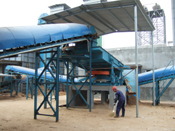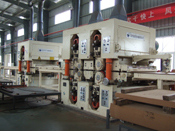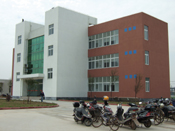LR Group goes for thick board
17 June 2009The Liren Wood Industry Group (LR Group) has an annual production capacity of 720,000m3 and was an early entrant to the Chinese MDF industry. Mike Botting visited its latest, rather unusual, line in Jiangshan City
The LR Group, then known as Lishui Oak, started life as a small government-owned sawmill beside the Oujiang River in Lishui, Zhejiang Province, in the early 1980s. The company entered the panel business with a wet-process fibreboard (hardboard) line in the mid-1980s and converted that into its first MDF line in 1988.
Today, the group has eight subsidiaries. They are Zhejiang Jiangshan Liren Wood Industry Group Limited Company, China Germany Joint-Venture Lishui Oak Man Made Board Limited Company, Fujian Liyang Man Made Board Limited Company, Fujian Lipu Man Made Board Limited Company, Fujian Liou Man Made Board Limited Company, Fujian Lijing Man Made Board Limited Company, Jiangsu Liyou Man Made Board Limited Company, Lishui Man Made Board Limited Company and Shanghai Wanxiang Wood Industry Limited Company.
The company became a privately-owned enterprise in 1993 under its current president and general manager Mr Xu Mengzhang.
The headquarters of the group is still in Lishui. Until recently the company had a mixture of Chinese-made multi-opening press lines and European-made continuous lines. One multi-opening line produced particleboard from urban waste wood but all the other lines produced MDF or HDF.
The first European-made continuous line was built as a greenfield construction project in Lishui in 2002/3 and produced its first MDF panel in August 2003. That continuous press came from Dieffenbacher of Germany and had a designed capacity of 150,000m3 of thin board. Today the line is capable of 170,000m3 a year.
The company’s second thin board line came from Siempelkamp and this ContiRoll press has an annual capacity of 200,000m3. It was built in Jiangyang in Fujian Province.
The third and latest continuous press line also came from Siempelkamp and was built in Jiangshan, Zhejiang Province.
“We already had the two thin board continuous press lines and we decided to build another continuous line for thick board,explained Yan Xiao Lin, general manager of Zhejiang Jiangshan Liren Wood Industry Ltd. “This area has a very prosperous wood processing industry and so there is a lot of wood raw material for us to make our MDF. We buy in chips, sawmill offcuts and small branches.”
One of the large local industries is in door manufacture and so this also provides a local market for the company’s panels. Mr Yan’s office door is in fact made locally from his company’s own product.
“Jiangshan is also close to three other provinces – Jiangxi, Fujian and Anhui and people who want to trade wood and logs come here,added the general manager.
The 81,000m2 Jiangshan factory site is in an industrial zone designated by the local government for the wood processing industry.
In common with most Chinese MDF manufacturers, Jiangshan Liren does not make value added products from its MDF.
“We had value added products within the group but we withdrew from that business because melamine facing board is an easy technology and there are too many small companies capable of doing this. There is not one dominant company in it because small companies can be very competitive.”
The LR Group signed the latest contract with Siempelkamp in November 2007 and construction on the site began in April 2008, with the machinery being installed from November of that year.
“This is very difficult ground, very solid, and we had to build it up by one metre with earth,said Mr Yan.
The line was completed at the end of March 2009 with the first board being produced on the 29th. At the time of my visit, the line was undergoing ‘fine tuning’.
The Siempelkamp contract included forming to the double-diagonal saw after the press. Wood preparation and chipping was supplied by Chinese companies, as was the oscillating chip screen, and refining came from German company Pallmann, which supplied a 50in diameter refiner. This is no ordinary ContiRoll press. It is four feet wide rather than the more common eight feet and is quite long for China, at 33.6m.
“We went for a longer press than we would have had in an eight foot width because we can produce better quality medium to thick board,said Mr Yan. “We intend to produce 9 to 18mm thick board.”
Quality control on the line is from SicoScan, a cooperation between Siempelkamp and Electronic Wood Systems (EWS). Design capacity of this line is 150,000m3, making it LR Group’s smallest-capacity continuous line, thus reducing the demand for raw material. The energy plant came from Chinese manufacturer Changzhou Union, while Shanghai Wood Based Panel Machinery Co Ltd supplied some of the conveyors on the production line.
Chips are not washed or dry cleaned, as a means of reducing costs. The six-head sander came from Chinese manufacturer Sufoma and there is no cut-to-size plant at Jiangshan. In common with almost every sizeable panel maker in China, Jiangshan Liren manufactures its own resin on site.
Currently the line is making E1 grade but the company intends to produce E0 in the future; the market is not really there yet, said Mr Luo Min, chief engineer at Jiangshan.
This is of course a difficult time to bring new production to the market and I asked Mr Yan how he felt about this.
“The market is very difficult at present. When we decided on this investment the market looked OK but during construction the market turned down but we had to continue and try to economize as much as possible on the cost of the plant while still being able to produce good quality boards,said the general manager.
However, he feels that his production will have a place in the market.
“Most of the thick board in China is produced on multi-opening presses and the quality cannot be compared with that from a ContiRoll. Our aim is that our production will replace that from the multi-opening lines,said Mr Yan.
There is some talk of consolidation by observers of the Chinese panel making industry but Mr Yan does not feel it is very likely and pointed out that even when companies do consolidate they still tend to trade separately.
“We used to have another eight multi-opening lines of 30,000 to 50,000m3 capacity but we have a smart boss who already sold those to other companies, leaving us with only larger-scale plants in our group and these have a lower cost per cubic metre and are more competitive. For instance there is much less sanding loss,added Mr Luo Min. “I know some small plants are closed or closing but unlike Europe, here, closing a mill does not necessarily mean it is finished. When the market improves it may be opened
up again.”


